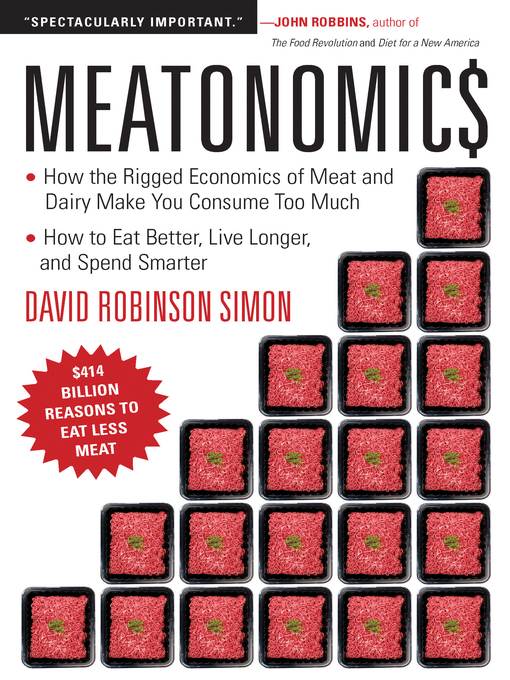
Meatonomics
How the Rigged Economics of Meat and Dairy Make You Consume Too Much—and How to Eat Better, Live Longer, and Spend Smarter
فرمت کتاب
ebook
تاریخ انتشار
2013
نویسنده
David Robinson Simonناشر
Red Wheel Weiserشابک
9781609258610
کتاب های مرتبط
- اطلاعات
- نقد و بررسی
- دیدگاه کاربران
نقد و بررسی

July 8, 2013
In this provocative and persuasive work, veganism advocate Simon argues for eating less meat and dairy (or giving it up altogether) as a means of fixing the broken American meat market, in which farmers regularly spend more than their animals’ value, but still come out on top thanks to more than $38 billion in annual subsidies. Simon wastes no time getting into explanations of serious economics and skillfully explains terms like “externalities” for the general reader. As he questions the deep ties between America’s meat industry and government regulators, readers will be hard-pressed not to wonder if something sinister is playing out in America’s farms and grocery stores. The bulk of the book is devoted to illustrating the enormous gap between the actual price of meat and the true cost in terms of economics, the environment, and health. Even though the horrors of factory farming are well known, the specific practices discussed here will inspire renewed outrage. Although the author’s largest suggestion for a “recipe for change” is a stretch (a 50% federal excise tax on meat and poultry, dairy, eggs, and fish), this is a well-researched, passionately written book. Agent: Lindsay Edgecombe, Levine Greenberg Agency.

September 15, 2013
In his debut title, lawyer and sustainability advocate Simon delivers a scathing critique of meatonomics, his term for the economic system underpinning the U.S. supply and consumption of animal foods. Simon argues that this system operates against consumer interest and in favor of industrial food suppliers--via artificially low meat and dairy prices, weak animal-cruelty laws, unnecessary farming subsidies, and other means--to persuade Americans to buy and eat more animal foods than they should. Simon delineates the negative impact of animal food consumption on our health and the environment and proposes a major excise tax on meat and dairy, reform of FDA and USDA oversight functions, and a conscious effort by consumers to eat fewer animal products. This assessment of the powerful animal food industry and the myriad government policies that support it is well researched and thought-provoking. But too often, Simon overstates his case and struggles to maintain a balanced analysis of this complex topic. VERDICT Readers seeking a broader, more nuanced look at the American food industry should try Marion Nestle's Food Politics.--Kelsy Peterson, Johnson Cty. Community Coll. Lib., Overland Park, KS
Copyright 2013 Library Journal, LLC Used with permission.

























دیدگاه کاربران